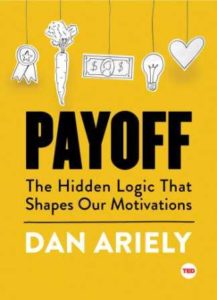The world doesn’t run on money, it runs on hope. Hope and motivation are the engines that keep us and this world running. In The Hidden Logic That Shapes Our Motivations, Dan Ariely look at various factors that impact us and push us to do things. Some that we want to do and some others that we do not. To perform at our peak efficiency and help others give their best, it is important to understand how motivation works.
Dan Ariely is the James B Duke Professor of Psychology and Behavioral Economics at Duke University.
Dan publishes widely in the leading scholarly journals in economics, psychology, and business. His work has been featured in a variety of media including The New York Times, Wall Street Journal, Washington Post, Boston Globe, Business 2.0, Scientific American, Science and CNN.
Payoff: The Hidden Logic That Shapes Our Motivations
Author: Dan Ariely
Series: TED Books
Hardcover: 128 pages
Publisher: Simon & Schuster/ TED (November 15, 2016)
ISBN-10: 1501120042, 978-1501120046
Payoff: The Hidden Logic That Shapes Our Motivations Summary
The author packs a punch in this short 100-odd pages book about motivation. The author begins with a personal story from his childhood when he suffered an injury and had to spend time in the hospital. The pain and circumstances forced him to think and realize the there is a deeper connection between what we really want to do and what we feel. The story tells us that we always want what we to amount to something meaningful for us and others.
Money is a great motivator. But it does not always work. When it does work, it is usually for a small time. Studies have showed that people who are paid twice in a month tend to be generally happier than those who are paid wages at the end of the month. Dan Ariely cites a different study that shows that bonuses and other monetary rewards give a short time boost, but the efficiency crashes much faster as the effects of the monetary rewards wane.
In a series of stories, the author highlights different aspects of motivation and tells readers and organizations that how stripping away a sense of belonging or achievement can have disastrous effects on workers. His story about a prison yard from a movie shows how Sisyphus work environment can destroy all the efforts the management puts in improving employee efficiency.
The author concludes The Hidden Logic That Shapes Our Motivations truthfully, saying that there is no one magical solution to motivate masses. Thankfully, there is still a differentiation between human and machines. And until then, we will have to rely on trying different things. But what is true is that humans put more emphasis on meaning and connection to things they make and people they meet more than Award plaques and salary or bonuses.
Payoff: The Hidden Logic That Shapes Our Motivations Reader Reviews
With research as varied a from Intel to that from Kindergarten, the author tells the readers different stories. Stories that are rooted in facts and on philosophy. The readers like that the book is not prescriptive and doesn’t end in x things to motivate someone. For those who like Dan Ariely’s work, the book has very little new to offer. For those who haven’t listened to the guy, the book tells you a lot about motivation in a compressed form.
Payoff: The Hidden Logic That Shapes Our Motivations Critics Reviews
“Ariely writes in an approachable, chipper style, but some readers may find his ambiguous findings unsatisfying . . . ” ~ Kirkus Reviews
Dan Ariely on Motivation
Additional Reading
Conversation with Dan Ariely about The Hidden Logic That Shapes Our Motivations
